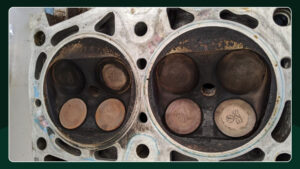
4 Symptoms of Bent Engine Valves (And How to Prevent Them)
In a four-stroke internal combustion engine, the intake and exhaust valves play a vital role in the vehicle’s ability to convert fuel into power.
What do the valves do?
Valves control the movement of fluid through the system. In a car engine, this fluid is air. This force of combustion creates the car’s performance.
Nearly all vehicles with internal combustion engines have intake and exhaust valves. These valves are located inside the cylinder head.
Main causes of bent valves
1) Engine over-revving
Automakers determine the maximum speed of an engine based on a variety of factors. For example, the weight and balance of the rotating assembly, the strength of the valve springs, heat, harmonics, available oil supply, and more can all be considered when engineers design and load test an engine. The gearbox can also affect this decision. In a manual transmission car, shifting into a gear that is too low for the speed the car is traveling can cause the engine to over-rev. This is also known as a “money shift” and is a big mistake that can damage the engine.
If you press the clutch when the wheels are spinning too fast for the gear you selected, the ECU can’t do anything to protect you from serious mechanical damage. After all, your own brain is the transmission computer in a manual transmission.
It is generally not recommended to operate an engine above the manufacturer’s specified maximum speed unless you upgrade many of the engine’s internal components. Required upgrades vary by make and model.
2) The engine is not properly tuned
Engine “timing” refers to the ignition timing that tells the spark plugs when to fire. This timing can also refer to the engine’s mechanical cam timing. As the crankshaft rotates, the cam timing dictates when to open the valves for each cylinder.
3) Broken Timing Belt
If the timing belt breaks on an interference engine, it is very likely that the pistons will come into contact with the valves and cause the valves to bend. This is one of the reasons why it is so important to replace your timing belt on time.
Timing belts usually work fine until they fail. You may not get any warning before the timing belt breaks, or at least, once it does, there is nothing you can do about it. Timing chains usually don’t require maintenance unless there is an issue with the timing chain tensioner.
4) Low Engine Oil Level
Motor oil is essential to the health of your engine. If your engine oil level is too low to provide sufficient oil pressure throughout your engine, a variety of problems can occur.
Most of the problems caused by low oil are inexpensive to repair, but checking and maintaining your oil level is very inexpensive. Don’t forget this important step in car ownership. How to tell if you have a bent valve
The best way to determine if you have a bent valve is to remove the cylinder head so you can physically access the valve. This is a lot of work, so most people perform a compression test or a leak test instead.
A compression test tells you how much compression each cylinder produces. It’s a quick and easy litmus test to assess the health of your engine.
If you hear a hissing sound of air coming from the intake, you may have a bent intake valve. If you hear a hissing sound coming from the exhaust, you may have a bent exhaust valve.
So I have a bent valve. Now what? Depending on how low the compression is, you may want to have the cylinder head done. If there are other engine issues, trading in for a low mileage used engine may also be a viable option.

